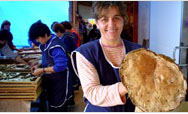You are here » Home » Telling Our Story
First Person
A prosecutor takes aim at South Africa’s white collar criminals
Fighting White Collar Crime

| |
Photo: USAID
|
|
Glynnis in the background during a court appearance.
“Once we get a sufficient number of higher skilled prosecutors, in five to 10 years, white collar crime will be under control,” said Glynnis.
|
By her second year in law school, Glynnis Breytenbach knew she wanted to be a prosecutor. A native of rural Free State, South Africa, she started prosecuting minor financial crimes in 1987 and was prosecuting commercial crimes by 1990. At the same time, when apartheid’s authoritarian controls were lifted, crime rates surged and South Africa became a destination for criminal syndicates. By 2000, commercial crime was siphoning $6 billion a year from the economy.
The South African government began fighting back with laws and crime-fighting institutions adapted from international best practices. In 1999, a Specialized Commercial Crime Court and Prosecuting Unit was established in Pretoria. “The Unit,” as it is called, had almost no budget when it opened its doors. Working with an association of South African corporations, USAID stepped in, providing training in trial skills for financial crimes that Glynnis described as “particularly beneficial.” A computerized case load management system was established to enhance their work. The Unit works as a team with police, investigators, and dedicated magistrates.
Today, the Specialized Commercial Crime Court and Prosecuting Unit in Pretoria is a busy place. Police investigators and prosecutors work under common guidelines and in the same office space. When charges of a commercial crime are reported, the police assign an investigator and the Unit assigns a prosecutor. Computerized planning documents improve case flow management and ensure each docket will contain everything needed for trial. “By the time a docket is ready,” says Glynnis, “even though it’s likely a yard thick, the prosecutor knows everything in there.”
The Unit has been very effective. Despite the high volume of cases, they have achieved conviction rates of over 90%. Building on this success, the Department of Justice opened more courts in Johannesburg, Port Elizabeth, and Durban. These new courts have also achieved high conviction rates.
Glynnis says the Unit’s success shows promise. “We are seeing a deterrent effect. Once we get a sufficient number of higher skilled prosecutors, in five to 10 years, white collar crime will be under control.”
Print-friendly version of this page (431kb - PDF)
Click here for high-res photo
Back to Top ^ | 

